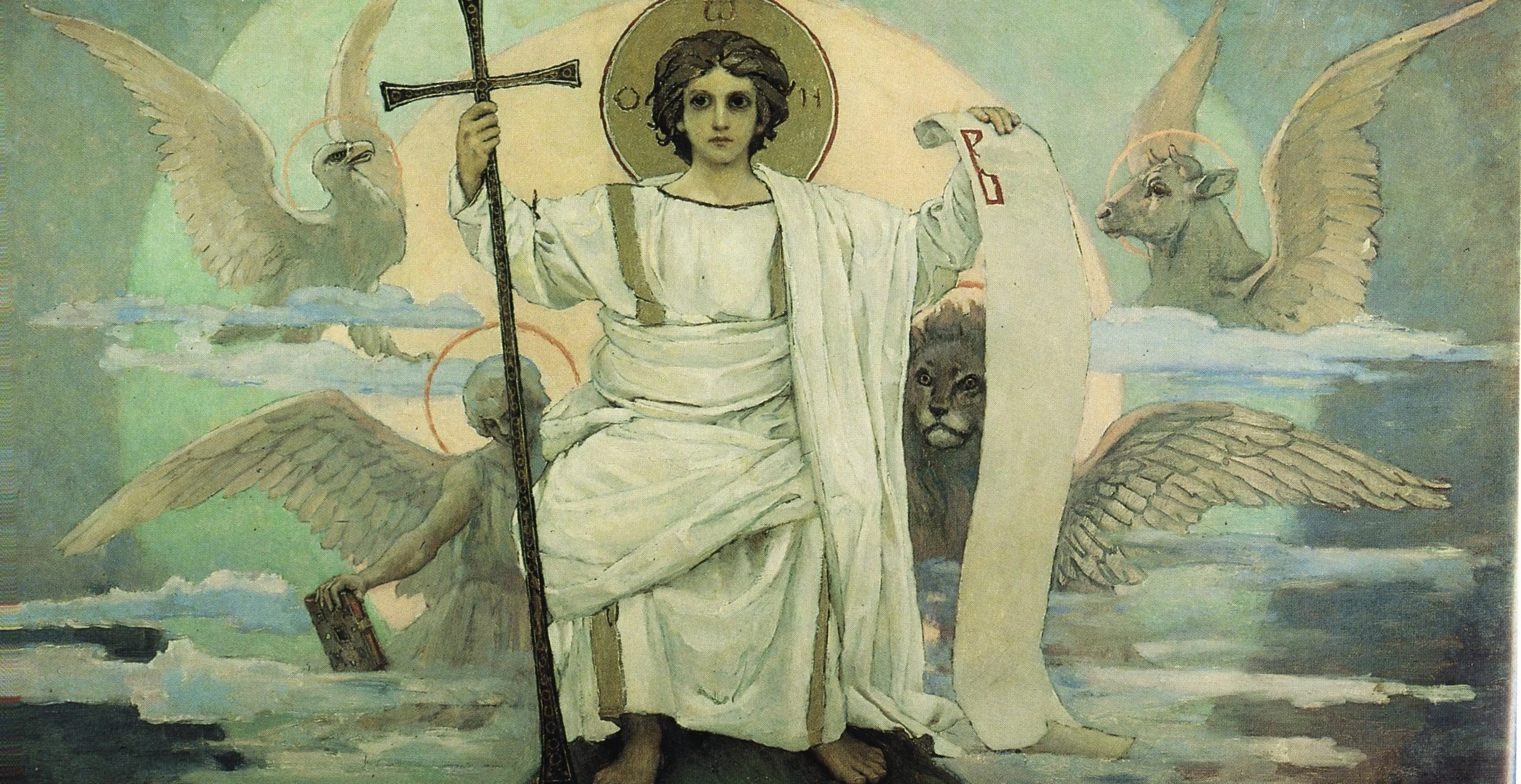Jesus, Son of God
Viktor Mikhailovich Vasnerosov (1848–1926). His only begotten son and the word of God. Preparation for a Vladimir cathedral frsco 1885–1896 Tretyakov Gallery
To hear more discussion among scholars about this topic, check out PODCAST 1 on the Podcast page.
Print version: PDF
What Does It Mean to Call Jesus “Son of God”?
Jesus is commonly referred to as “Son of God.” The term is used as if everyone knows what it means.
The title implies that Jesus was some form of divine entity. A few hundred years after Jesus lived, early Christians debated what that meant. They tried to define the title using philosophical concepts. Some current concepts about the divinity of Jesus originate in those later debates. People who identify themselves as Christians today hold many different beliefs about what this means.
What “Son of God” meant for people in the first century, however, did not match assumptions in later debates or what we may assume today. Understanding some of what it meant when New Testament authors were writing can help us think about what it means today.
Roman Emperor, Son of God
Jesus was born into a world ruled by the Roman empire. The ruler of that world was an emperor who was known by several titles. One title was “Son of God.”
After he became the sole ruler of the empire, the first Roman emperor, Caesar Augustus, strategically added the title “Son of God” to his name. Augustus did not use the title “king” because the Romans hated it. They remembered overthrowing tyrant kings in an earlier era to become a republic. Even as Augustus began to function as a king, he could not use that title. He presented himself as restoring the Roman republic while he was actually concentrating power in his own hands. He used titles other than “king” to be a monarch without being called one. One of those titles was “Son of God.”
Augustus acquired the title “Son of God” in stages. He was the adopted son of Julius Caesar. Julius openly displayed his aspirations to be a dictator. For this he was assassinated in the Roman senate by a large group of senators. Later when a meteor appeared, however, the same senators saw it as a sign that Julius had become a god. The Roman senate thus declared Julius Caesar to be divine, a god. As his adopted son, Augustus then used the title “son of the god Julius.” Soon he dropped “Julius” to be called more simply “Son of God.” Some of his successors also used the title.
Other Sons of God
The term “son of god” was not used much in the first century other than as a title for the Roman emperor or, among his followers, for Jesus. However, the life stories told about heroic figures at the time often included an account of their mothers being impregnated by a god. A famous athlete’s mother, for example, was said to have had intercourse with Herakles (Hercules) appearing in the form of her husband. Herakles was also said to have fathered Alexander the Great. Lore about many famous philosophers also mentioned the gods who were their fathers. Royal traditions in other cultures of the ancient near east, including Jewish traditions, also portrayed kings as sons of god.
According to the stories of the conception and birth of Caesar Augustus, the god Apollo fathered him. Not only did he have the title of “Son of God” based on his adoptive father becoming a god after his death, but he was also understood to be of divine origin according to the accounts of his birth. These narratives identified him with the other heroes whose fathers were gods and indicated royalty without calling him a king.
It is hardly surprising, then, to read narratives of Jesus having a divine father. His early followers thought of him as no less of a hero than others whose fathers were gods.
Emperors and Heroes as Divine
Many people today tend to view divine and human as more separate than first-century people did. Julius Caesar, for example, ascended to divine status by a vote of the Roman senate. Being divine was in some ways a special human status. Recognition of a human’s divinity was an acknowledgement of their power and distinctiveness.
Today we also associate worship with our individual beliefs. In New Testament times, worship was viewed more as an action that indicated devotion. Worship outwardly demonstrated an acknowledgement of the power of the deity being worshipped. Most people did not consider belief in that deity as an issue. When subjects of the Roman emperor worshipped him in the temples and shrines devoted to him, they were acknowledging his power and acting together for the unity of the empire.
Jesus as Son of God like the Emperor
Early followers of Jesus identified him as Son of God in a world where the title signified a ruler of the world. To call Jesus “Son of God” indicated that they saw him as the ruler of their world. In a world where signs of the worship of the Roman emperor were everywhere, their identification of Jesus as Son of God proclaimed their devotion to Jesus instead of the emperor.
When the early followers of Jesus called Jesus “Son of God” after his death, they were making a profound and radical statement about Jesus. They were elevating him to a status equal to the Roman emperor’s and choosing him as their ruler. Later generations discussed what that has meant as a matter of belief. For the first century, it was a choice of devotion.
Suggested Readings:
Miller, Robert J. Born Divine: The Births of Jesus & Other Sons of God. Santa Rosa, CA: Polebridge Press, 2003.
Peppard, Michael. The Son of God in the Roman World: Divine Sonship in Its Social and Political Context. New York, Oxford: Oxford University Press, 2011.


